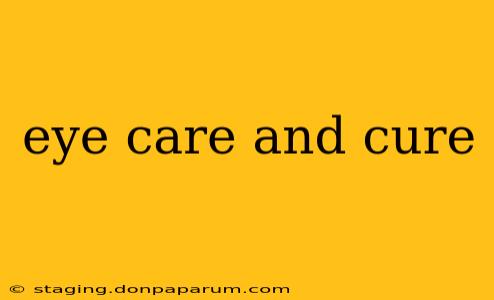Maintaining healthy eyes is crucial for overall well-being. Our eyes are complex organs, and understanding how to care for them properly is essential for preventing vision problems and preserving sight. This comprehensive guide explores various aspects of eye care, from everyday practices to addressing specific concerns.
Understanding Common Eye Problems
Before diving into preventative measures and treatments, let's familiarize ourselves with some prevalent eye conditions:
Refractive Errors:
- Myopia (Nearsightedness): Difficulty seeing distant objects clearly. Corrected with concave lenses.
- Hyperopia (Farsightedness): Difficulty seeing nearby objects clearly. Corrected with convex lenses.
- Astigmatism: Blurred vision at all distances due to an irregularly shaped cornea. Corrected with cylindrical lenses. These conditions are often correctable with eyeglasses, contact lenses, or refractive surgery.
Age-Related Eye Diseases:
- Cataracts: Clouding of the eye's lens, leading to blurry vision. Treated with surgery to replace the clouded lens.
- Glaucoma: Damage to the optic nerve, often due to increased pressure within the eye. Treated with eye drops, medication, or surgery.
- Macular Degeneration: Deterioration of the macula, the central part of the retina, resulting in loss of central vision. Treatment options vary depending on the type of macular degeneration. Early detection is key.
Other Eye Conditions:
- Dry Eye Syndrome: Lack of sufficient lubrication and moisture on the eye's surface, causing irritation and discomfort. Treated with artificial tears, eye drops, or other therapies.
- Conjunctivitis (Pink Eye): Inflammation of the conjunctiva (the membrane lining the eyelid and covering the white part of the eye). Can be caused by bacterial, viral, or allergic reactions. Treatment depends on the cause.
Daily Practices for Eye Health
Implementing these daily habits can significantly contribute to better eye health:
Protecting Your Eyes from the Sun:
UV rays are a major contributor to various eye problems, including cataracts and macular degeneration. Always wear sunglasses that offer 100% UV protection, even on cloudy days. Choose sunglasses with large lenses that wrap around the sides of your face for optimal protection.
Maintaining a Healthy Diet:
A diet rich in antioxidants, omega-3 fatty acids, and vitamins like A, C, and E is essential for eye health. Include leafy green vegetables, fruits, nuts, and fatty fish in your diet.
Practicing Proper Hygiene:
Wash your hands thoroughly before touching your eyes to prevent the spread of infection. Avoid rubbing your eyes excessively.
Regular Eye Examinations:
Schedule regular comprehensive eye exams, even if you don't experience any vision problems. Early detection of eye diseases is crucial for effective treatment and preserving your vision. The frequency of these exams will depend on your age, risk factors, and overall eye health, as advised by your ophthalmologist.
Taking Breaks from Screen Time:
Prolonged screen time can lead to digital eye strain. Follow the 20-20-20 rule: every 20 minutes, look at an object 20 feet away for 20 seconds.
When to Seek Professional Help
It's important to consult an ophthalmologist or optometrist immediately if you experience any sudden changes in vision, eye pain, redness, excessive tearing, or flashes of light. Early intervention is crucial for managing many eye conditions.
Conclusion
Maintaining optimal eye health requires a multifaceted approach encompassing proactive measures and regular professional care. By following the guidelines outlined above and seeking timely professional attention when necessary, you can significantly improve your chances of preserving clear and healthy vision throughout your life. Remember, preventative care is key to a lifetime of clear vision.

